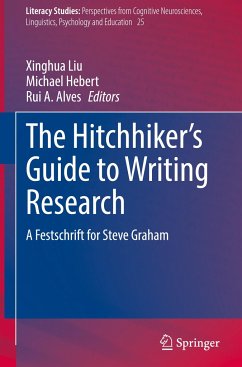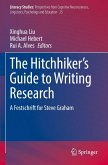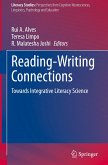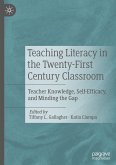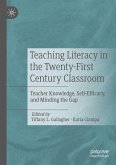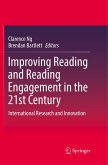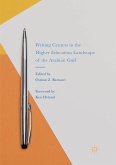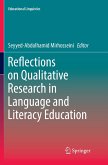The Hitchhiker's Guide to Writing Research
A Festschrift for Steve Graham
Herausgegeben:Liu, Xinghua; Hebert, Michael; Alves, Rui A.
The Hitchhiker's Guide to Writing Research
A Festschrift for Steve Graham
Herausgegeben:Liu, Xinghua; Hebert, Michael; Alves, Rui A.
- Gebundenes Buch
- Merkliste
- Auf die Merkliste
- Bewerten Bewerten
- Teilen
- Produkt teilen
- Produkterinnerung
- Produkterinnerung
This book brings together the work of established scholars from around the world to celebrate and honor the many ways in which Steve Graham has contributed to the advancement of teaching and researching writing. Focusing on writing development and writing instruction in different contexts of education, original contributions in this book critically engage with theoretical and empirical issues raised in Steve Graham's influential body of work and significantly extend our understandings of the importance of writing in developing learners' literacy and the roles of writing in teaching and…mehr
Andere Kunden interessierten sich auch für
![The Hitchhiker's Guide to Writing Research The Hitchhiker's Guide to Writing Research]() The Hitchhiker's Guide to Writing Research112,99 €
The Hitchhiker's Guide to Writing Research112,99 €![Reading-Writing Connections Reading-Writing Connections]() Reading-Writing Connections119,99 €
Reading-Writing Connections119,99 €![Teaching Literacy in the Twenty-First Century Classroom Teaching Literacy in the Twenty-First Century Classroom]() Teaching Literacy in the Twenty-First Century Classroom75,99 €
Teaching Literacy in the Twenty-First Century Classroom75,99 €![Teaching Literacy in the Twenty-First Century Classroom Teaching Literacy in the Twenty-First Century Classroom]() Teaching Literacy in the Twenty-First Century Classroom75,99 €
Teaching Literacy in the Twenty-First Century Classroom75,99 €![Improving Reading and Reading Engagement in the 21st Century Improving Reading and Reading Engagement in the 21st Century]() Improving Reading and Reading Engagement in the 21st Century97,99 €
Improving Reading and Reading Engagement in the 21st Century97,99 €![Writing Centers in the Higher Education Landscape of the Arabian Gulf Writing Centers in the Higher Education Landscape of the Arabian Gulf]() Writing Centers in the Higher Education Landscape of the Arabian Gulf75,99 €
Writing Centers in the Higher Education Landscape of the Arabian Gulf75,99 €![Reflections on Qualitative Research in Language and Literacy Education Reflections on Qualitative Research in Language and Literacy Education]() Reflections on Qualitative Research in Language and Literacy Education75,99 €
Reflections on Qualitative Research in Language and Literacy Education75,99 €-
-
-
This book brings together the work of established scholars from around the world to celebrate and honor the many ways in which Steve Graham has contributed to the advancement of teaching and researching writing. Focusing on writing development and writing instruction in different contexts of education, original contributions in this book critically engage with theoretical and empirical issues raised in Steve Graham's influential body of work and significantly extend our understandings of the importance of writing in developing learners' literacy and the roles of writing in teaching and learning processes.
This book is organized around themes central to Steve Graham's work, including theories and models of writing, effective instructional methods in teaching writing, surveys on teaching and learning writing, and systematic review studies on writing.
Apart from regular chapters, the book also features personal and scholarly reflections revealing the powerful waysinwhich Steve Graham's work has influenced our thinking in the field of writing research and continues to open up new avenues for future research endeavors.
This book is organized around themes central to Steve Graham's work, including theories and models of writing, effective instructional methods in teaching writing, surveys on teaching and learning writing, and systematic review studies on writing.
Apart from regular chapters, the book also features personal and scholarly reflections revealing the powerful waysinwhich Steve Graham's work has influenced our thinking in the field of writing research and continues to open up new avenues for future research endeavors.
Produktdetails
- Produktdetails
- Literacy Studies 25
- Verlag: Springer / Springer International Publishing / Springer, Berlin
- Artikelnr. des Verlages: 978-3-031-36471-6
- 2023
- Seitenzahl: 480
- Erscheinungstermin: 2. Oktober 2023
- Englisch
- Abmessung: 241mm x 160mm x 32mm
- Gewicht: 881g
- ISBN-13: 9783031364716
- ISBN-10: 3031364716
- Artikelnr.: 68095400
- Herstellerkennzeichnung
- Springer-Verlag GmbH
- Tiergartenstr. 17
- 69121 Heidelberg
- ProductSafety@springernature.com
- Literacy Studies 25
- Verlag: Springer / Springer International Publishing / Springer, Berlin
- Artikelnr. des Verlages: 978-3-031-36471-6
- 2023
- Seitenzahl: 480
- Erscheinungstermin: 2. Oktober 2023
- Englisch
- Abmessung: 241mm x 160mm x 32mm
- Gewicht: 881g
- ISBN-13: 9783031364716
- ISBN-10: 3031364716
- Artikelnr.: 68095400
- Herstellerkennzeichnung
- Springer-Verlag GmbH
- Tiergartenstr. 17
- 69121 Heidelberg
- ProductSafety@springernature.com
Xinghua Liu, PhD., is an Associate Professor at School of Foreign Languages, Shanghai Jiao Tong University, China. He received his Ph.D. in Applied Linguistics from the University of Reading, UK and completed his post-doctorate training in writing research at Arizona State University, USA. His research interests include psychology of written production, linguistic profile of English-language learners' written corpus, and validation of effective writing interventions. He serves on the editorial boards of International Journal of TESOL Studies and International Journal of Chinese Language Teaching. He is currently a member of the steering committee for International Society for the Advancement of Writing Research. Michael Hebert, PhD., is an Associate Professor at the University of California, Irvine (UCI) and Director of the UCI Writing Project. His interests include the impacts of writing on reading, writing assessment, and the development of writing interventions. Dr. Hebert co-authored two influential Carnegie Corporation reports: Writing to Read and Informing Writing, and he was the co-editor of Best Practices in Writing Instruction, third edition. He is also the Primary Investigator for a Pandemic Recovery grant from the Institute of Education Sciences to accelerate reading achievement in rural Nebraska schools. He serves on the editorial board for the Journal of Educational Psychology. Dr. Hebert was previously a classroom teacher and reading specialist in schools in New Hampshire, Massachusetts, California, and the Navajo Nation. Rui A. Alves is an Associate Professor of Psychology at the University of Porto. His main research interests are the cognitive and affective processes in writing, which he studies using experimental methods and logging tools. He and his team have studied the development of text production using an own-developed handwriting logging software (HandSpy) and developed many evidence-based writing interventions addressing cognitive, motivational, and self-regulatory aspects of writing. He serves on several editorial boards and is an Associate Editor of the journal Reading & Writing, Springer. Currently, he is the interim coordinator of the European Literacy Network, ELN, and serves on the executive boards of ISAWR and EARLI.
Preface.- Part I: Theorizing Writing and Writing Research.- Self-Regulated Strategy Development: Evolution of an Evidence-based Instructional Model for Complex Learning and Emergent Areas of Research; Karen Harris.- A Model to Account for How Writers Choose Words to Express Their Emotions in Written Text; John Hayes.- Underlying Motivation of Writer(s) Within Community Model of Writing: More than Just Cherry Pie; Angelique Aitken.- A Meta Look at Writing Meta-Analyses: Where We've Come, Where We Are Now, and Where We Might Go Next; Tanya Santangelo and Michael Hebert.- Part II: Professional Development and Educational Reforms.- Professional Development Study on Self-regulated Strategy Development; Debra McKeown.- Teaching Chinese Characters in Primary Grades in Macao; Tien Ping Hsiang.- Teachers' Subject-Matter Content Knowledge and Pedagogical Content Knowledge; Gary A. Troia.- Postsecondary Developmental Education in Writing: Issues and Research; Charles A. MacArthur.- Part III: Teaching Writing Skills.- On Spelling Impact on Composing? A Longitudinal Study in Written French; Bernard Slusarczyk, Pascal Bressoux and Michel Fayol.- Is First Grade Children's Use of Academic Words in Writing Associated with Learning Science Topics? Jill Fitzgerald, Jackie Eunjung Relyea, Jeff Elmore and James Kim.- It was a dark and stormy sentence: Teaching the Fine Art of Sentence Construction; Bruce Saddler.- Influence of Linguistic Perspective on Expressive Writing; Rui A. Alves, Francisca Costa, Teresa Jacques and Ana Paula Azzam.- Supporting Writing and Writing Engagement through Promoting Regulation, Motivation and Perezhivanie; Clarence Ng and Peter Renshaw.- Part IV: Learner's Knowledge about Writing.- Changes in Writing Knowledge After Participation in an Integrated STEM and Writing-to-Learn Unit; Gillespie Rouse.- Elementary English Learner's Knowledge About Writing; Kay Wijekumar.- Facticity in Writing: Methods, Data, Evidence in Knowledge Production; Charles Bazerman.- What Makes Good Writing: Chinese EFL Learners' Perceptions and Practices; Xinghua Liu and Clare Furneaux.- Part V: Teaching Writing for Students at Risk.- Building Skills for Efficient Writing; Linda H. Mason.- Strategy Instruction for Secondary Students with Learning Disabilities and Struggling Writers: A Review of Empirical Research; Amber B. Ray.- Writing-to-Learn Mathematics Using SRSD for 5th and 6th Grade Special Education Students; Kiuhara, S. A., Levin, J. R., Tolbert, M.,Erickson, M. and Kruse, K..- The Role of Executive Functions in Handwriting Performance of Higher-Education Students; Naomi Weintraub.
Preface.- Part I: Theorizing Writing and Writing Research.- Self-Regulated Strategy Development: Evolution of an Evidence-based Instructional Model for Complex Learning and Emergent Areas of Research; Karen Harris.- A Model to Account for How Writers Choose Words to Express Their Emotions in Written Text; John Hayes.- Underlying Motivation of Writer(s) Within Community Model of Writing: More than Just Cherry Pie; Angelique Aitken.- A Meta Look at Writing Meta-Analyses: Where We've Come, Where We Are Now, and Where We Might Go Next; Tanya Santangelo and Michael Hebert.- Part II: Professional Development and Educational Reforms.- Professional Development Study on Self-regulated Strategy Development; Debra McKeown.- Teaching Chinese Characters in Primary Grades in Macao; Tien Ping Hsiang.- Teachers' Subject-Matter Content Knowledge and Pedagogical Content Knowledge; Gary A. Troia.- Postsecondary Developmental Education in Writing: Issues and Research; Charles A. MacArthur.- Part III: Teaching Writing Skills.- On Spelling Impact on Composing? A Longitudinal Study in Written French; Bernard Slusarczyk, Pascal Bressoux and Michel Fayol.- Is First Grade Children's Use of Academic Words in Writing Associated with Learning Science Topics? Jill Fitzgerald, Jackie Eunjung Relyea, Jeff Elmore and James Kim.- It was a dark and stormy sentence: Teaching the Fine Art of Sentence Construction; Bruce Saddler.- Influence of Linguistic Perspective on Expressive Writing; Rui A. Alves, Francisca Costa, Teresa Jacques and Ana Paula Azzam.- Supporting Writing and Writing Engagement through Promoting Regulation, Motivation and Perezhivanie; Clarence Ng and Peter Renshaw.- Part IV: Learner's Knowledge about Writing.- Changes in Writing Knowledge After Participation in an Integrated STEM and Writing-to-Learn Unit; Gillespie Rouse.- Elementary English Learner's Knowledge About Writing; Kay Wijekumar.- Facticity in Writing: Methods, Data, Evidence in Knowledge Production; Charles Bazerman.- What Makes Good Writing: Chinese EFL Learners' Perceptions and Practices; Xinghua Liu and Clare Furneaux.- Part V: Teaching Writing for Students at Risk.- Building Skills for Efficient Writing; Linda H. Mason.- Strategy Instruction for Secondary Students with Learning Disabilities and Struggling Writers: A Review of Empirical Research; Amber B. Ray.- Writing-to-Learn Mathematics Using SRSD for 5th and 6th Grade Special Education Students; Kiuhara, S. A., Levin, J. R., Tolbert, M.,Erickson, M. and Kruse, K..- The Role of Executive Functions in Handwriting Performance of Higher-Education Students; Naomi Weintraub.

